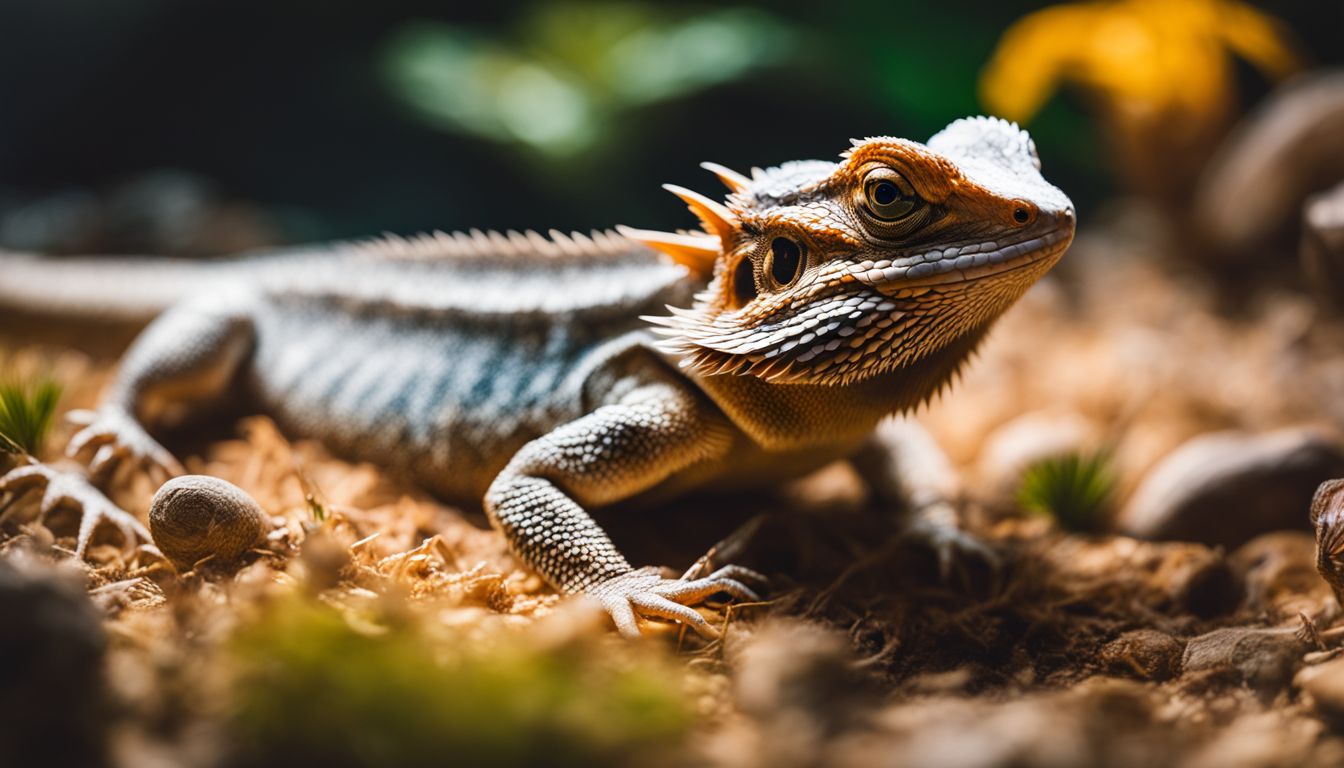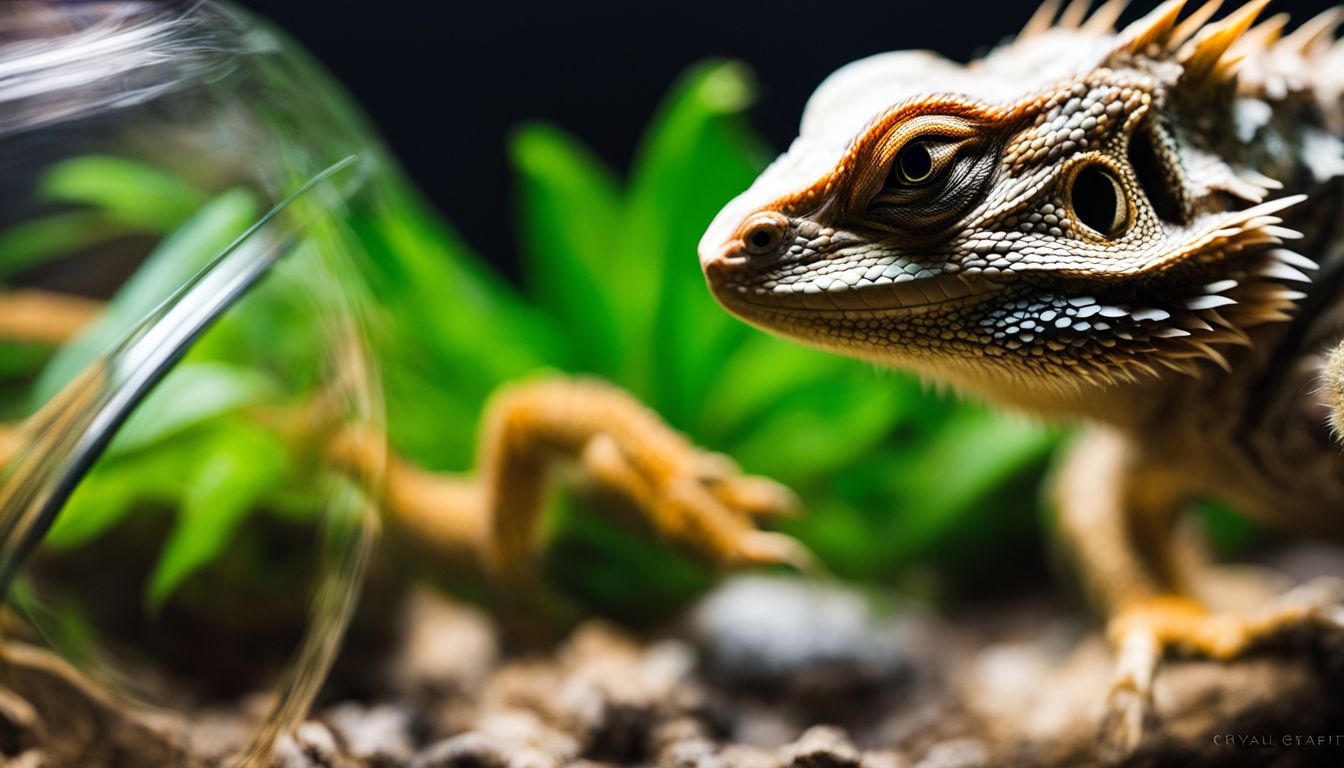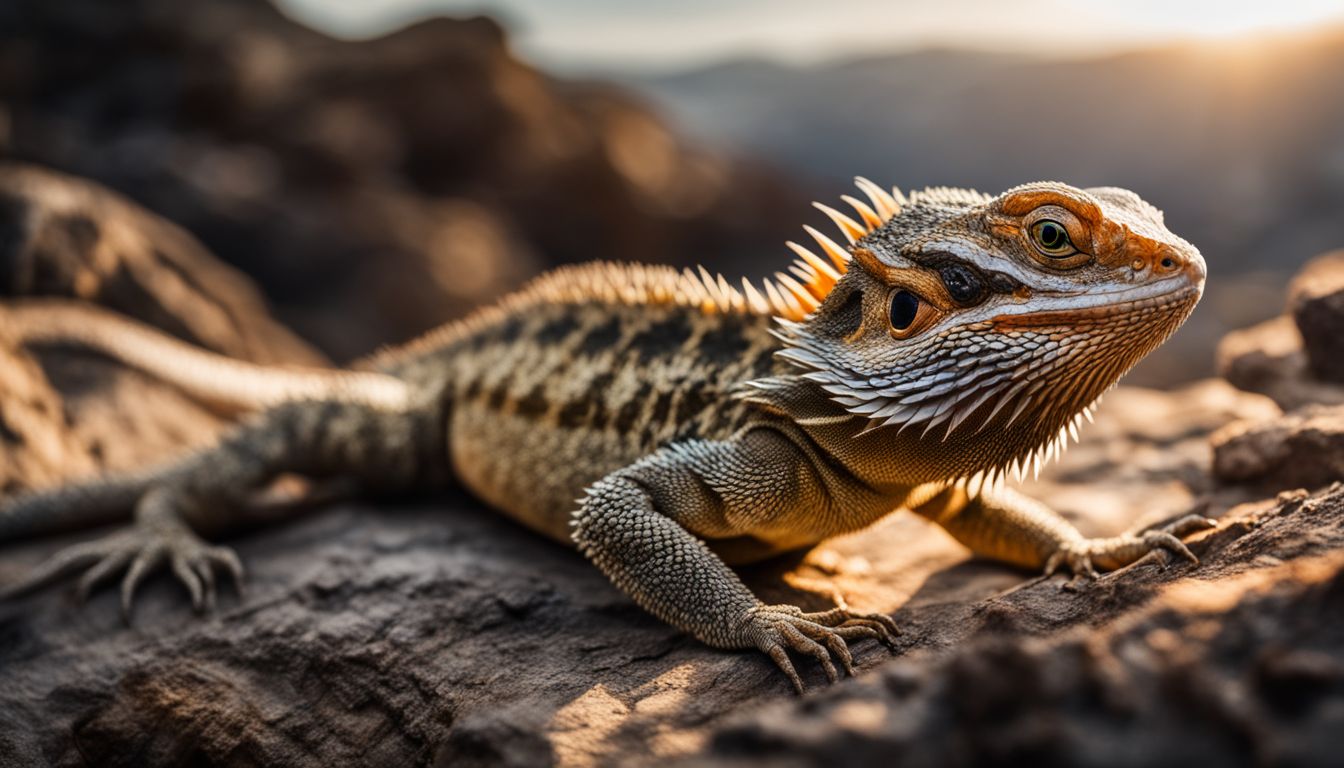Have you ever watched your bearded dragon eye a spider and wondered if it’s safe for them to eat? Surprisingly, while bearded dragons can munch on spiders, it’s not always the best option.
This article will guide you through the risks and safer dietary choices for your reptilian pet. Read on for all the details!
Can Bearded Dragons Eat Spiders?

Moving from a broad introduction to the specific diet considerations, let’s dive into whether bearded dragons can indeed munch on spiders. Technically, yes, bearded dragons can eat spiders.
This fact might seem like a quick and easy answer to expanding their menu options. However, it’s crucial to note that making spiders a regular part of their diet is not recommended.
Spiders, especially those caught in your home, may carry parasites and other health risks.
Given the chance, a bearded dragon might gobble up a spider or two they come across in their enclosure. Yet feeding them these eight-legged critters as deliberate prey should be approached with caution.
Avoid poisonous spiders at all costs to prevent potential threats to your reptile buddy’s well-being. While curiosity about including various insects in their diet is understandable, prioritizing safety and nutrition for these beloved lizards is key.
Risks of Feeding Spiders to Bearded Dragons

Feeding spiders to bearded dragons can pose risks such as potential parasite infestation, especially if the spider has consumed an intermediate host. Venomous spiders can also endanger your pet dragon and should be avoided in their diet.
Additionally, spiders lack significant nutritional value for bearded dragons, making them an unsuitable food choice.
Potential Parasite Carriers
Spiders might seem like an easy snack for your bearded dragon, but they can bring unwanted guests. These tiny crawlers may carry parasites that pose health risks to your exotic pet.
Bearded dragons themselves can harbor Salmonella in their droppings—a fact highlighting how reptiles are often host to various infections.
Handling or ingesting a spider by your bearded dragon increases the chance of disease transmission. Parasites from other animals could end up moving around on their bodies, leading to contamination and possibly requiring veterinary care.
Always prioritize safety and consider the risks before introducing spiders into their diet.
Danger of Venomous Spiders
Venomous spiders pose a real threat to bearded dragons. The Black Widow and Brown Recluse are especially dangerous—eating them can be toxic or even fatal. These reptiles don’t have immunity against the venom from such toxic spiders.
This makes venoms a serious risk in their diet.
Beyond their venom, these arachnids might also cause allergic reactions in bearded dragons. It’s clear that feeding your pet any spider carries risks, not just because of the potential for venom but also due to possible parasitic infections.
Let’s now explore why spiders lack nutritional value for your bearded dragon.
Lack of Nutritional Value
Feeding spiders to bearded dragons lacks essential nutritional value. Spiders do not provide the necessary nutrients for a bearded dragon’s diet, resulting in insufficient nourishment.
This could lead to a deficient intake of vital vitamins and minerals, impacting the overall dietary quality for these reptiles.
It is important to understand that feeding spiders to bearded dragons does not offer any significant nutritional benefit and could result in inadequate dietary intake. Instead, it’s crucial to consider safer and more nutritious food options that can fulfill their dietary requirements effectively..
What If My Bearded Dragon Eats A Spider?
If your bearded dragon eats a spider, monitor for any signs of illness. While venom from the spider is broken down in its stomach acid, there’s still a risk of potential parasites and ingestion of harmful species.
It’s best to limit their exposure to spiders and stick to safe and nutritious foods like fruits, vegetables, and insects that are not caught at home.
Remember to seek veterinary advice if you notice any concerning symptoms after your bearded dragon ingests a spider. Be cautious and consider the health concerns associated with feeding spiders before letting them become part of your pet’s diet.
Poisonous Spiders to Avoid
Be cautious! Bearded dragons should avoid these poisonous spiders:
- Black Widow spider – highly venomous and dangerous to pets.
- Brown Recluse spider – its bite can lead to tissue damage and severe illness.
- Redback spider – known for its potent venom that can cause serious harm.
- Funnel-web spider – aggressive and harmful, especially to small animals like reptiles.
- Brazilian Wandering spider – has a neurotoxic venom that can be fatal.
Safe and Nutritious Foods for Bearded Dragons
Bearded dragons benefit from a diet that includes a variety of fruits, vegetables, and insects. Ensuring they have access to nutritious foods like pomegranates and other suitable options promotes their health.
Fruits
Fruits are a nutritious part of a bearded dragon’s diet.
- Apples, peaches, strawberries, apricots, and blackberries are safe for bearded dragons in moderation.
- Bananas should be avoided as they don’t provide nutritional benefits.
- Strawberries are an excellent treat for bearded dragons due to their high vitamin C, manganese, folate, and potassium content.
- Grapes, melons, and raisins can also be included in a bearded dragon’s diet on occasion.
- While vegetables and greens can be given daily, fruits should be limited to ensure a balanced diet for your pet reptile.
Pomegranates
Pomegranates are safe for bearded dragons to eat, but they should only be given occasionally due to their medium-heavy oxalate levels. Although pomegranates contain high levels of antioxidants that protect from cellular damage, they can also deplete calcium in the beardies’ system.
Despite being rich in vitamins, the risk of calcium depletion makes it best to offer pomegranates sparingly as part of a balanced diet.
When considering fruits for bearded dragons, it’s essential to understand how each one impacts their health. Pomegranates should be included rarely to prevent potential negative effects on your pet’s well-being and ensure a nutritious diet overall.
Vegetables
Vegetables are an essential part of a bearded dragon’s diet, providing vital nutrients and fiber. Leafy greens like kale and collard greens are excellent choices due to their high calcium content. Other safe vegetables include bell peppers, squash, and carrots, offering a variety of vitamins and minerals. Offer these vegetables raw or cooked, ensuring they are thoroughly washed to remove any pesticides or contaminants.
Insects
Bearded dragons eat a variety of insects for protein. They can eat crickets, mealworms, Dubia roaches, silkworms, and hornworms. Here are some safe and nutritious foods for bearded dragons:
- Crickets – Provide essential protein and are commonly fed to bearded dragons.
- Mealworms – Rich in protein and fats, they should be part of a varied diet but not the primary food source.
- Dubia Roaches – High in protein and low in chitin, making them easy to digest compared to other insects.
- Silkworms – A great source of protein and have a soft body that’s easy for bearded dragons to digest.
- Phoenix Worms – Nutritious worms high in calcium, naturally balanced calcium-phosphorus levels.
Ideal Diet for Bearded Dragons
Bearded dragons thrive on a balanced diet of insects, fruits, and vegetables. Adult dragons typically need 80% plants and 20% insects for their omnivorous diet. Live foods like crickets, locusts, and other protein-rich insects are suggested to ensure adequate calcium intake.
Alongside this, a variety of greens, fruits, and vegetables should be included in their diet to provide a wide range of nutrients necessary for their well-being.
It’s essential to maintain the balance between insects and plant-based foods to offer an ideal mix of nutrients for your pet dragon. This ensures that they receive the required proteins, vitamins, minerals – including calcium – from their diet.
Fruits such as pomegranates can also be beneficial additions due to their nutritious value.
Should You Feed Your Bearded Dragon Bugs Caught At Home?
After learning about the ideal diet for bearded dragons, it’s crucial to consider whether feeding your pet bugs caught at home is safe. While convenient, wild-caught insects may pose risks due to potential exposure to pesticides and parasites.
It’s important to avoid spiders, moths, and other carnivorous insects that could carry harmful substances or parasites. Instead, opt for safe options such as crickets and locusts rich in protein and calcium – essential for your bearded dragon’s health.
When considering bugs from the wild, prioritize safety by avoiding potential pesticide exposure. Be cautious of what your pet consumes to ensure their well-being – stick to known nutritious options like crickets instead of taking chances with unsafe choices.
Conclusion
In sum, bearded dragons can technically eat spiders but it’s not recommended. They may pose a risk due to potential parasites and lack of nutritional value. Always provide a balanced diet for your pet including safe insects, veggies, and fruits – no house spiders needed! Remember, safety first when it comes to feeding your scaly friend.
FAQs
1. Can bearded dragons eat spiders?
Yes, bearded dragons can eat small spiders as part of their diet.
2. Are all types of spiders safe for bearded dragons to eat?
No, it’s important to ensure that the spiders are not venomous and are of an appropriate size for the bearded dragon to consume safely.
3. How often can I feed my bearded dragon with spiders?
Feeding your bearded dragon with spiders should only occur occasionally and should not make up a significant portion of their diet.
4. What precautions should I take when feeding my bearded dragon with spiders?
When offering spiders to your bearded dragon, ensure they are from a pesticide-free environment and have not been exposed to any harmful chemicals.
5. Can feeding my bearded dragon with too many spiders cause health issues?
Excessive consumption of spiders may lead to digestive problems in bearded dragons, so it’s essential to moderate their intake.




